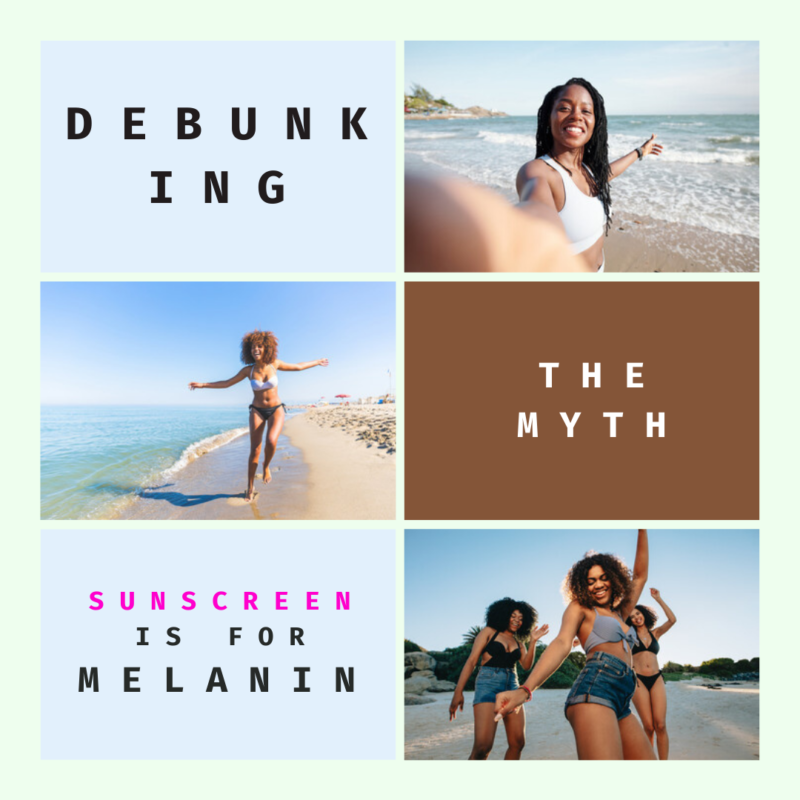Uncategorized
The Importance of Sunscreen for People with Melanin-Enriched Skin (Debunking the Myth about Sunscreen for black skin)
Introduction
In recent years, there has been a growing misconception that people with melanin-enriched skin don’t need to worry as much about sunscreen. But let me tell you, this couldn’t be further from the truth. Sunscreen is just as crucial for individuals with darker skin tones as it is for those with fair skin. While it’s true that melanin provides some natural protection against the sun’s harmful rays, it’s important to understand that it’s not a foolproof shield. (BTW the ozone and the layers of protection from ancient times have been nearly depleted). Clearly, it’s the same sun yet humans are not experiencing the sun in the same way. The reality is that everyone, regardless of their skin color, needs to take sun protection seriously. In fact, studies have shown that people with darker skin are at a higher risk of developing skin cancer in areas that are less pigmented, such as the palms and soles of the feet. So, let’s debunk the myth once and for all and emphasize the importance of sunscreen for all skin types. Don’t underestimate the power of sun protection – it’s a vital step in maintaining the health and radiance of your skin, no matter its color.
Understanding Melanin-Enriched Skin
Melanin is a pigment that gives color to our skin, hair, and eyes. People with melanin-enriched skin have higher levels of melanin, which provides some natural protection against the sun’s ultraviolet (UV) radiation. The higher the melanin levels, the more protection there is against sunburns and skin damage. This is why individuals with darker skin tones tend to have a lower risk of sunburns compared to those with fair skin.
However, it’s important to note that while melanin provides some protection, it’s not a complete shield against UV radiation. People with darker skin can still experience sun damage, which can lead to skin cancer, premature aging, and hyperpigmentation. Therefore, relying solely on melanin for sun protection is not enough.
The Myth about Sunscreen and Black Skin
One of the most prevalent myths surrounding sunscreen and black skin is that individuals with darker skin tones don’t need to use sunscreen because their natural melanin provides sufficient protection. This misconception has led many people to neglect sunscreen, putting themselves at risk of sun damage.
Contrary to popular belief, sunscreen is essential for people with melanin-enriched skin. While it’s true that darker skin tones have a lower risk of sunburns, they are still susceptible to the long-term effects of sun exposure. Sunscreen helps to block harmful UV rays, reducing the risk of skin cancer, premature aging, and hyperpigmentation.
The Importance of Sunscreen for All Skin Types
Sunscreen is not exclusive to any particular skin type. It is a vital component of a comprehensive skincare routine for all individuals, regardless of their skin color. The damaging effects of UV radiation can affect anyone, and sunscreen acts as a protective barrier against these harmful rays.
For people with melanin-enriched skin, sunscreen is especially important in areas that are less pigmented, such as the palms and soles of the feet. These areas are more susceptible to sun damage and skin cancer due to the lower melanin levels. By applying sunscreen regularly, individuals can ensure that their skin is adequately protected from the sun’s harmful effects.
Sunscreen and Its Role in Preventing Skin Cancer
Skin cancer is a serious concern for people of all skin types, including those with melanin-enriched skin. While it’s true that individuals with darker skin have a lower risk of developing skin cancer, it’s important to remember that no one is immune to this disease.
UV radiation from the sun is a leading cause of skin cancer, and sunscreen plays a crucial role in preventing its development. By applying sunscreen with a high sun protection factor (SPF), individuals can significantly reduce their risk of developing skin cancer. It’s essential to apply sunscreen generously and reapply it every two hours, especially when spending time outdoors.
Sunscreen and Its Role in Preventing Premature Aging
Premature aging is a common concern for individuals of all ages and skin types. Exposure to the sun’s UV rays can accelerate the aging process, leading to wrinkles, fine lines, and age spots. Sunscreen acts as a shield, protecting the skin from these harmful rays and slowing down the aging process.
By incorporating sunscreen into their daily skincare routine, individuals can maintain youthful-looking skin and reduce the appearance of premature aging. Sunscreen not only helps to prevent wrinkles and fine lines but also keeps the skin hydrated and protected from environmental damage.
Sunscreen and Its Role in Preventing Hyperpigmentation
Hyperpigmentation is a condition characterized by the darkening of certain areas of the skin. It can be caused by various factors, including sun exposure. People with melanin-enriched skin are more prone to hyperpigmentation, as their skin produces more melanin.
To prevent and minimize hyperpigmentation, it’s crucial to use sunscreen regularly. Sunscreen helps to block the harmful UV rays that can trigger the production of excess melanin, leading to dark spots and uneven skin tone. By applying sunscreen daily, individuals can protect their skin from hyperpigmentation and maintain a more even complexion.
Choosing the Right Sunscreen for Melanin-Enriched Skin
When it comes to choosing sunscreen for melanin-enriched skin, there are a few key factors to consider. Look for a broad-spectrum sunscreen that protects against both UVA and UVB rays. UVA rays can penetrate deeper into the skin, leading to long-term damage, while UVB rays are responsible for sunburns.
Additionally, opt for a sunscreen with a high SPF, preferably SPF 30 or higher. The higher the SPF, the greater the protection against UV radiation. It’s also important to choose a sunscreen that is non-comedogenic and suitable for your skin type to avoid clogged pores and breakouts.
Tips for Using Sunscreen Effectively
To ensure optimal sun protection, it’s essential to use sunscreen correctly. Here are a few tips to help you use sunscreen effectively:
- Apply sunscreen generously: Use enough sunscreen to cover all exposed areas of your skin. Don’t forget commonly overlooked areas, such as the ears, neck, and backs of the hands.
- Reapply regularly: Sunscreen should be reapplied every two hours, or more frequently if you are swimming or sweating. Even water-resistant sunscreens can wear off over time, so it’s important to reapply to maintain adequate protection.
- Use sunscreen year-round: UV radiation is present even on cloudy days and during the winter months. Make sunscreen a part of your daily skincare routine, regardless of the weather.
- Seek shade: In addition to wearing sunscreen, seek shade during the sun’s peak hours, typically between 10 am and 4 pm. This will further reduce your exposure to harmful UV rays.
Sunscreen Myths and Misconceptions
There are several myths and misconceptions surrounding sunscreen that can prevent individuals from using it effectively. Let’s debunk a few of these myths:
- Myth: People with darker skin don’t need sunscreen. Reality: While darker skin tones have some natural protection, sunscreen is still essential to prevent sun damage and reduce the risk of skin cancer.
- Myth: Sunscreen causes vitamin D deficiency. Reality: While sunscreen can reduce the production of vitamin D, it’s still possible to obtain sufficient levels through diet and supplementation. The benefits of sun protection outweigh the risks of vitamin D deficiency.
- Myth: Sunscreen is only necessary at the beach or on sunny days. Reality: UV radiation is present year-round, regardless of the weather. Sunscreen should be used daily as part of a comprehensive skincare routine.
…
The belief that people with melanin-enriched skin don’t need sunscreen is a dangerous myth that needs to be debunked. Sunscreen is crucial for everyone, regardless of their skin color. Melanin provides some natural protection, but it’s not enough to shield the skin from the harmful effects of UV radiation.
By incorporating sunscreen into your daily skincare routine, you can protect your skin from sunburns, skin cancer, premature aging, and hyperpigmentation. Choose a broad-spectrum sunscreen with a high SPF, and remember to apply it generously and reapply regularly for optimal protection.
Don’t let misconceptions about sunscreen put your skin at risk. Embrace the power of sun protection and maintain the health and radiance of your skin, no matter its color.


